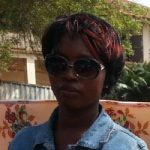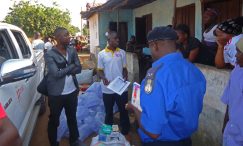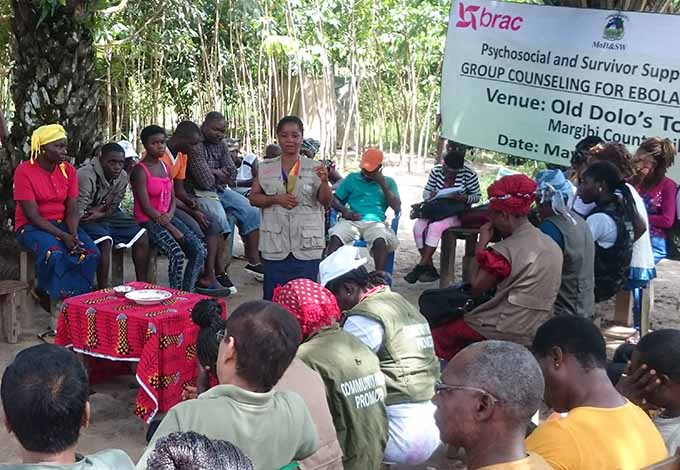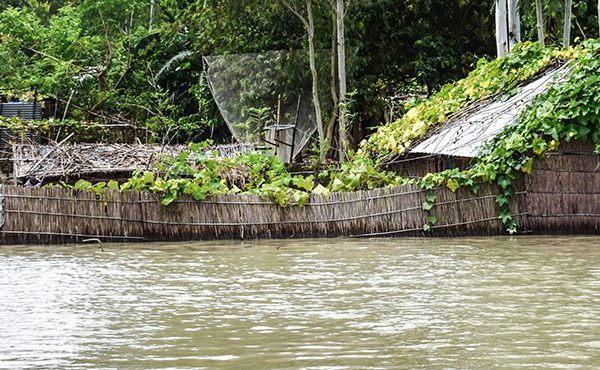Reading Time: 3 minutes
“My name is Salimatu, I am 20 years old and an ELA member of the Kukubana club in Rokupr. I really do not know how I contracted the virus. One day, my aunt saw that I was bleeding, and I had a high fever. Knowing too well these are symptoms of the disease, she called the Ebola hotline (117) and they arrived later with an ambulance. I was taken to the Lakka treatment centre where I stayed for three weeks.
[infobox align=”right”]
Salimatu survives the scourge
 “My name is Salimatu, I am 20 years old and an ELA member of the Kukubana club in Rokupr. I really do not know how I contracted the virus. One day, my aunt saw that I was bleeding, and I had a high fever. Knowing too well these are symptoms of the disease, she called the Ebola hotline (117) and they arrived later with an ambulance. I was taken to the Lakka treatment centre where I stayed for three weeks.
“My name is Salimatu, I am 20 years old and an ELA member of the Kukubana club in Rokupr. I really do not know how I contracted the virus. One day, my aunt saw that I was bleeding, and I had a high fever. Knowing too well these are symptoms of the disease, she called the Ebola hotline (117) and they arrived later with an ambulance. I was taken to the Lakka treatment centre where I stayed for three weeks.
My message to the public, especially fellow adolescents, is that if you feel sick, immediately visit the hospital. I was discharged from the treatment centre a few weeks ago feeling healthy even though I have partially lost my sight. I’m so grateful to my ELA club mentor Kadiatu Kargbo who is providing me with psychosocial training. I thank God for giving me a strong support system and for saving my life.”
[/infobox]
Having endured a civil war only 13 year ago, Sierra Leone is once again fighting a deadly battle- the Ebola virus. Around 9,162 people have been killed by the virus according to data from WHO. Of these figures, Sierra Leone has recorded about 3,341 deaths and 10,934 cases up till 10 February 2015. While the government continues to take strides in tackling transmission by speeding up access to treatment and safe burials, there is still need for coordinated effort at an international level.
BRAC donated USD 13,195 worth of items to the Ministry of Health and Sanitation. Items included buckets with attached taps, surgical gloves, phenolic disinfectant solutions and face masks. Hygiene products and information, education and communication (IEC) materials were sent to all BRAC offices, field staff, and public schools.
Port Loko, with many homes in quarantine, has taken a heavy toll from the virus. To ameliorate the situation, BRAC’s human rights and legal empowerment programme in Sierra Leone (HRLE) in partnership with Action for Advocacy and Development launched the ‘Support to Quarantine Communities and Households in Port Loko’ project funded by the DFID Ebola emergency response fund through Trocaire Sierra Leone. The project involves the distribution of food and non-food items complementing the work of the World Food Programme (WFP).
In partnership with District Health Management Team (DHMT), BRAC trained 135 community health volunteers in the Western Area to participate in the surge operation in seven communities. The intervention includes distribution of IEC materials and soap to about 30,000 households. Partnering with Comic Relief, BRAC also identified and recruited 50 peer educators in five slums. Volunteers and project staff trained on key Ebola preventive measures are currently helping city councillors and national surveillance teams with tracing and reporting cases.
With schools and most recreational centres closed, girls in particular have been limited in movement, some confined to their homes. BRAC’s empowerment and livelihood for adolescents programme (ELA) in collaboration with the Ministry of Social Welfare Gender and Children Affair (MSWGCA), have distributed grants to young Ebola survivors to help them create small livelihoods. These grants are distributed to orphans, sexually abused children, and to families with children affected by Ebola, in the regions of Port Loko, Kambia, Moyamba and Pujehun. The grants, which consist of two disbursements of LE 200,000 (USD 47) each, will help 1,050 Ebola-affected children.
In the areas recovering from the Ebola crisis, access to schools is still limited. The existing ELA club spaces used as social centres, are also supporting adolescents to continue with their learning. About 840 radio sets were provided for radio-based lessons along with textbooks and stationeries. Due to the stigma attached to Ebola, the mentors and staff, trained on Ebola prevention, also know how to counsel and give support to help those affected to reintegrate into their communities.
Pascal Masuba is a development professional at communications, BRAC International.







